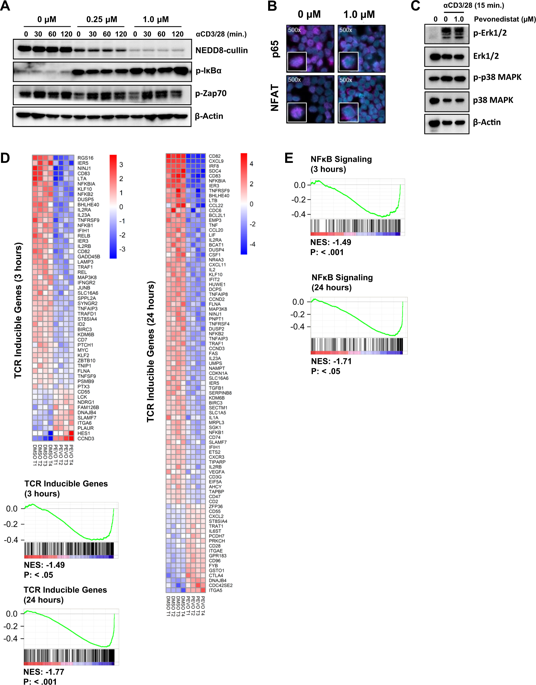Leukemia ( IF 12.8 ) Pub Date : 2020-03-16 , DOI: 10.1038/s41375-020-0794-0 Scott Best 1 , Vi Lam 1 , Tingting Liu 1 , Nur Bruss 1 , Adam Kittai 1 , Olga V Danilova 1 , Susan Murray 2 , Allison Berger 3 , Nathan D Pennock 4 , Evan F Lind 1 , Alexey V Danilov 1, 5

|
Novel targeted agents used in therapy of lymphoid malignancies, such as inhibitors of B-cell receptor-associated kinases, are recognized to have complex immune-mediated effects. NEDD8-activating enzyme (NAE) has been identified as a tractable target in chronic lymphocytic leukemia (CLL) and non-Hodgkin lymphoma. We and others have shown that pevonedistat (TAK-924), a small-molecule inhibitor of NAE, abrogates NF-κB signaling in malignant B cells. However, NF-κB pathway activity is indispensable in immune response, and T-cell function is altered in patients with CLL. Using T cells derived from patients with CLL, we demonstrate that although targeting NAE results in markedly differential expression of NF-κB-regulated genes and downregulation of interleukin (IL)-2 signaling during T-cell activation, T cells evade apoptosis. Meanwhile, NAE inhibition favorably modulates polarization of T cells in vitro, with decreased Treg differentiation and a shift toward TH1 phenotype, accompanied by increased interferon-γ production. These findings were recapitulated in vivo in immunocompetent mouse models. T cells exposed to pevonedistat in washout experiments, informed by its human pharmacokinetic profile, recover NAE activity, and maintain their response to T-cell receptor stimulation and cytotoxic potential. Our data shed light on the potential immune implications of targeting neddylation in CLL and lymphoid malignancies.
中文翻译:

哌维酮他汀(NEDD8激活酶抑制剂)对慢性淋巴细胞性白血病T细胞的免疫调节作用
公认用于淋巴恶性肿瘤治疗的新型靶向药物,例如B细胞受体相关激酶的抑制剂,具有复杂的免疫介导作用。NEDD8激活酶(NAE)已被确定为慢性淋巴细胞性白血病(CLL)和非霍奇金淋巴瘤的可治疗靶标。我们和其他人已经表明,pevonedistat(TAK-924)是NAE的一种小分子抑制剂,可消除恶性B细胞中的NF-κB信号传导。然而,在CLL患者中,NF-κB途径的活性在免疫应答中是必不可少的,并且T细胞功能也发生了改变。使用源自CLL患者的T细胞,我们证明,尽管靶向NAE导致NF-κB调节基因的表达明显不同,并且T细胞活化过程中白介素(IL)-2信号的下调,但T细胞可逃避凋亡。与此同时,reg分化和向T H 1表型的转变,伴随着干扰素-γ产生的增加。在免疫活性小鼠模型中概括了这些发现。在冲洗实验中,暴露于pevonedistat的T细胞通过其人类药代动力学特征获知,可恢复NAE活性,并维持其对T细胞受体刺激和细胞毒性潜能的反应。我们的数据揭示了在CLL和淋巴样恶性肿瘤中靶向腺苷酸化的潜在免疫意义。











































 京公网安备 11010802027423号
京公网安备 11010802027423号